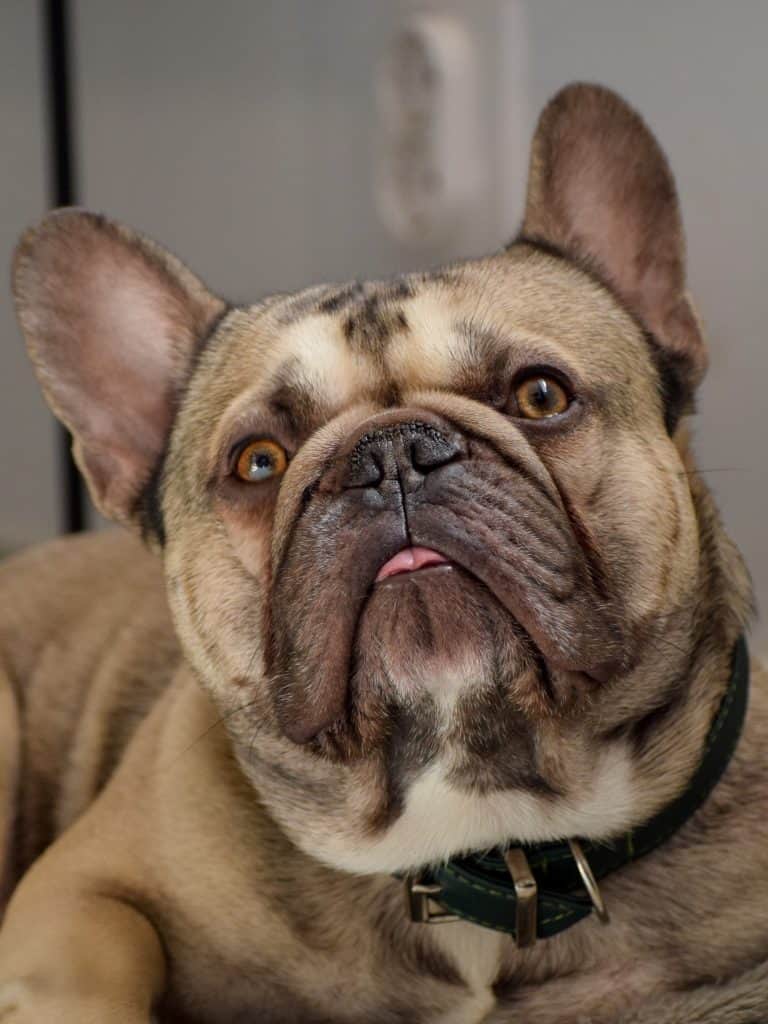French Bulldogs are beloved companion dogs known for their charming personalities, adorable looks, and compact size. However, if you find yourself with a French Bulldog that seems unusually large, you may be wondering why. This article explores seven surprising reasons why your French Bulldog may be bigger than expected. Let’s dive in and unravel the mysteries behind your big-hearted, big-bodied Frenchie!
Why is my French Bulldog so big?
1. Genetics: The Big Genes
Genetics plays a crucial role in determining the size and physical traits of French Bulldogs. Like humans, these adorable canines inherit their characteristics from their parents and ancestors. Specific genes within their lineage can influence their size, and if your Frenchie has big and robust ancestors, it’s not surprising for them to grow larger than the average French Bulldog.
When it comes to genetics, French Bulldogs possess a combination of genes from both their mother and father. These genes determine various aspects of their physical appearance, including size, body structure, and overall build. For example, if their lineage includes larger French Bulldogs, such as those with broader chests or heavier bone structures, your Frenchie may likely exhibit a larger size.

It’s important to note that genetic traits can be inherited in complex ways, and the influence of genes on a dog’s size is only sometimes straightforward. Other factors, such as environmental influences and the interplay of multiple genes, can also impact the final outcome. However, the genetic predisposition for a larger size is often a significant contributing factor.
Breeders who aim to produce larger French Bulldogs selectively breed individuals with desirable size traits. By breeding larger Frenchies, they increase the chances of passing on those specific genes for size to future generations. However, this intentional breeding for larger sizes can result in French Bulldogs larger than the average standard set for the breed.
It’s important to remember that the size of your French Bulldog does not necessarily determine its health or overall well-being. While size can vary, providing proper care, nutrition, and regular veterinary check-ups is crucial to ensure your furry friend remains healthy and happy regardless of size.
2. Nutrition: Feast or Fluff
Feeding your French Bulldog a well-balanced diet is essential for their overall health, development, and weight management. The type and amount of food you provide can significantly impact their growth, including their body size. If your Frenchie has been receiving an excess of calories or a diet high in protein, it may lead to accelerated growth and a larger body size.
Excessive calorie intake can contribute to weight gain and the development of excess body fat in dogs. French Bulldogs are prone to weight-related health issues such as joint problems, respiratory difficulties, and heart conditions. Therefore, ensuring that your Frenchie’s diet is appropriately balanced and portioned to maintain a healthy weight is crucial.
A nutritionally balanced diet for a French Bulldog typically includes high-quality protein, carbohydrates, healthy fats, vitamins, and minerals. The proportion of these nutrients should be appropriate for your Frenchie’s age, activity level, and overall health. Consult your veterinarian to determine the specific dietary needs of your French Bulldog, as they can provide valuable guidance tailored to your pet’s individual requirements.

When it comes to portion sizes, avoid overfeeding your French Bulldog. Feeding guidelines on pet food packages can be a good starting point, but remember that individual dogs may have different metabolic rates and activity levels. In addition, your veterinarian can assess your Frenchie’s body condition and recommend appropriate portions to maintain a healthy weight.
Avoid the temptation to indulge your French Bulldog with excessive treats or table scraps. These can contribute to an unbalanced diet and lead to weight gain. Instead, opt for healthy, low-calorie treats and limit their intake.
Regular exercise is also crucial for maintaining healthy body weight in French Bulldogs. Engage your Frenchie in everyday physical activities such as walks, playtime, and mental stimulation exercises. Not only will this help manage their weight, but it will also contribute to their overall well-being and happiness.
3. Gender Differences: Boy vs. Girl
Gender differences can significantly affect the size variations observed in French Bulldogs. As with many species, including dogs, there are often distinct physical differences between males and females. In the case of French Bulldogs, male individuals tend to be larger and more muscular than their female counterparts.
While it’s important to note that there can be exceptions to this general rule, it is relatively common for male French Bulldogs to exhibit a slightly larger size. Male dogs typically have more muscle mass, a broader chest, and a more robust overall build than females. These characteristics contribute to their larger appearance.

Biological and hormonal factors primarily influence the differences in size between male and female French Bulldogs. Male dogs naturally possess higher testosterone levels, promoting muscle development and growth. This hormonal influence can produce a more substantial and muscular physique than females.
It’s essential to remember that the size difference between male and female French Bulldogs is often subtle. The variation in size may not be drastic, and individual dogs within each gender can still exhibit a range of sizes and body types. Additionally, other factors, such as genetics and individual variation, can contribute to the size differences observed among French Bulldogs.
While males tend to be larger, it’s crucial to note that size alone does not determine the quality or value of a French Bulldog. Both male and female Frenchies can make loving and delightful companions, regardless of their size. Whether you have a petite female or a robust male, what matters most is their temperament, health, and the bond you share with your furry friend.
4. Early Development: Late Bloomers
French Bulldogs, like many dog breeds, go through various stages of growth and development. It’s important to understand that their growth rates can differ among individuals, and some Frenchies may exhibit a slower growth trajectory during their puppyhood but experience a growth spurt later on, leading to a larger overall size.
They undergo rapid growth and development during the first few months of a French Bulldog’s life. However, the rate at which they grow can vary from one Frenchie to another. As a result, some French Bulldogs may appear smaller or slower in their growth during this initial phase, and it’s not uncommon for them to reach their full size later than their peers.
It’s crucial to be patient and allow your Frenchie to grow at their own pace. Growth spurts can occur at different times for different dogs, and it’s essential to provide them with a nurturing environment and proper nutrition throughout their development.

Factors such as genetics, nutrition, and overall health can influence a French Bulldog’s growth rate and final size. For example, genetic predispositions inherited from their parents and lineage can significantly determine their growth patterns. Providing a well-balanced and nutritionally appropriate diet can also support healthy growth and development.
Consulting with your veterinarian is vital to ensure your Frenchie grows and develops appropriately. They can assess your dog’s growth trajectory, monitor their weight, and provide guidance on nutrition and care to promote healthy growth.
Remember that every French Bulldog is unique, and their growth patterns can vary. While some may reach their full size earlier, others may have a delayed growth. Please provide them with the necessary care, nutrition, and veterinary support to ensure their optimal development and well-being.
5. Mixed Heritage: Frenchie Blend
Crossbreeding between different dog breeds can result in a wide range of physical characteristics, including size variations. For example, if your French Bulldog is a mix of breeds, such as a French Bulldog crossed with a larger breed like a Boxer or Bulldog, it can explain their bigger size. These crossbreeds, often referred to as “Designer Bulldogs” or “Frenchton Bulldogs,” frequently exhibit a larger stature due to the genetic influence of the larger parent breed.
When French Bulldogs are crossed with larger breeds, such as Boxers or Bulldogs, the resulting offspring may inherit traits from both parent breeds. The genes responsible for size in the larger breed can significantly impact the size of the crossbred French Bulldog. This genetic influence can lead to crossbred French Bulldogs being larger than the average purebred French Bulldog.

It’s important to note that the size of a crossbred French Bulldog can vary depending on the specific combination of parent breeds and the genes inherited from each. While some may have a noticeably larger size, others may exhibit a more moderate increase in size compared to purebred French Bulldogs. It’s also possible for a crossbred French Bulldog to show characteristics and traits from both parent breeds in addition to their size.
When considering a crossbred French Bulldog, it’s essential to research and understand the traits and potential health concerns associated with the specific parent breeds involved. Ensure that the breeder is reputable and knowledgeable about the breed mix, and ask for health clearances and information about the parent dogs.
Additionally, be aware that crossbred French Bulldogs may need to adhere to the breed standards set for purebred French Bulldogs. The size and appearance of a crossbred French Bulldog can vary widely, which can be both exciting and challenging for potential owners.
6. Health Factors: Thyroid Trouble
While genetics, diet, and breed variations are common factors contributing to the size of French Bulldogs, consider the possibility of underlying health conditions that may also play a role. Sometimes, a Frenchie’s larger size could be attributed to a medical condition, such as hypothyroidism.
Hypothyroidism is a disorder that affects the thyroid gland, which is responsible for regulating metabolism and other essential bodily functions. When a dog has hypothyroidism, their thyroid gland doesn’t produce enough thyroid hormone, leading to a range of symptoms, including weight gain, lethargy, and a slower metabolism.
Suppose your French Bulldog is noticeably larger than the average size for the breed and is experiencing weight gain or other concerning symptoms. In that case, consult your veterinarian for a thorough examination. They can assess your Frenchie’s overall health, perform diagnostic tests, and evaluate their thyroid function if necessary.

If hypothyroidism is suspected, your veterinarian may recommend blood tests to measure the levels of thyroid hormones. If the diagnosis is confirmed, appropriate treatment options, such as thyroid hormone supplementation, can be prescribed to help regulate your Frenchie’s metabolism and manage their weight.
It’s important to note that hypothyroidism is just one example of a health condition that can contribute to a Frenchie’s larger size. Other underlying medical issues, such as hormonal imbalances or certain metabolic disorders, could also play a role. Only a qualified veterinarian can properly diagnose and treat such conditions.
Regular veterinary check-ups and open communication with your veterinarian are essential in monitoring your French Bulldog’s health. If you notice any unusual changes in their size or suspect an underlying health issue, don’t hesitate to seek professional advice.
7. Individual Variations: It’s Just Who They Are
Indeed, individual variation can play a significant role in the size of French Bulldogs. Just like people, dogs come in different shapes and sizes, and your French Bulldog may simply be a naturally larger Frenchie, standing out from the typical breed standards. In such cases, there might not be a specific reason for their larger size other than their unique genetic makeup.
Like any other breed, French Bulldogs have breed standards that describe the ideal size, proportion, and appearance. However, it’s important to remember that not every dog will perfectly conform to those standards. Dogs, including French Bulldogs, can exhibit various sizes and physical characteristics within a breed. This natural variation is a testament to the diversity and beauty of the canine world.

If your French Bulldog is larger than the average size for the breed, embrace their uniqueness and love them for who they are. Their larger size doesn’t diminish their value or the joy they bring to your life. Instead, focus on their personality, temperament, and the special bond you share with them.
Ensure your French Bulldog’s overall health and well-being are maintained regardless of size. Provide them with appropriate nutrition, regular exercise, and veterinary care tailored to their needs. In addition, regular check-ups with your veterinarian can help monitor their health and address any concerns that may arise.
Remember that the love and companionship your French Bulldog provides are not dependent on their size. Cherish their individuality and enjoy every moment spent with your furry friend. Whether big or small, what truly matters is the unconditional love and happiness they bring into your life.
Conclusion
While French Bulldogs are generally known for their compact size, it’s not uncommon to come across larger individuals within the breed. Various factors, including genetics, nutrition, gender, development, mixed heritage, health, and individual variations, can contribute to a French Bulldog’s larger size. Remember to provide your Frenchie with a healthy lifestyle, regular veterinary care, and unconditional love, regardless of their size. Celebrate their uniqueness and enjoy the delightful companionship they bring, whether big, small or somewhere in between!

